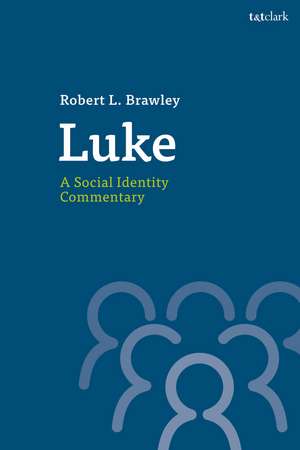Luke: A Social Identity Commentary: T&T Clark Social Identity Commentaries on the New Testament
Autor Professor Robert L. Brawleyen Limba Engleză Hardback – 19 feb 2020
Preț: 486.73 lei
Preț vechi: 858.59 lei
-43% Nou
Puncte Express: 730
Preț estimativ în valută:
93.14€ • 96.61$ • 77.66£
93.14€ • 96.61$ • 77.66£
Carte tipărită la comandă
Livrare economică 27 martie-10 aprilie
Preluare comenzi: 021 569.72.76
Specificații
ISBN-13: 9780567669391
ISBN-10: 0567669394
Pagini: 248
Dimensiuni: 156 x 234 mm
Greutate: 0.52 kg
Editura: Bloomsbury Publishing
Colecția T&T Clark
Seria T&T Clark Social Identity Commentaries on the New Testament
Locul publicării:London, United Kingdom
ISBN-10: 0567669394
Pagini: 248
Dimensiuni: 156 x 234 mm
Greutate: 0.52 kg
Editura: Bloomsbury Publishing
Colecția T&T Clark
Seria T&T Clark Social Identity Commentaries on the New Testament
Locul publicării:London, United Kingdom
Notă biografică
Robert L. Brawley is the Albert G. McGraw Professor Emeritus of New Testament at McCormick Theological Seminary, Chicago, USA.
Cuprins
Series Editors' PrefacePreface and AcknowledgementsPart 1 Introduction: Methods and ContextsI. Fictive Qualities of NarrativesII. Author, Audience, CompositionIII. The Narrative WorldIV. The Cultural EncyclopediaV. Sociological ApproachesVI. Social Identity TheoryVII. Philosophical Reflections on IdentityVIII. Feminism and PostcolonialismIX. Hidden Dimensions of Hierarchies of DominanceX. Social Identity, Christology, and DiscipleshipXI. Modesty in InterpretationPart 2 The Gospel of Luke: An OutlinePart 3 CommentaryI PrologueII Luke 1:5 -2:40 Births and Early Development of John the Baptizer and JesusIII Luke 3:1-22 John the BaptizerIV 3:23-4:13 Jesus's BeginningsV Luke 4:14-21:38 Jesus's 'Good-Newsing' of the ßas??e?a of God and its Extension VI Luke 22:1-24:53 Jesus's Passion, Resurrection, and AscensionBibliographyIndex
Recenzii
Robert Brawley provides an invaluable contribution to Lukan scholarship by offering a reading of Luke's text through the lens of social identity theory; such a lens not only illuminates Luke's Gospel, but offers a methodological framework for illuminating other New Testament texts as well. I heartily recommend this commentary to the specialist and non-specialist alike.
A fresh, stimulating construal of Luke's Gospel; drawing on social identity theory but firmly anchored in a nuanced understanding of narrative analysis as practiced by those who see texts as social constructions of reality, rather than mimetic representations of some presumed 'ontic reality'. This commentary's interpretations focus on the interplay between the language of the text and the complex social dynamics reflected in the text, and how this interpretive calculus functions in forming the identity of those who produced these texts and heard them read or performed.
Identity and collective memory help to illumine, but do not overwhelm, this reading of Luke's Gospel. Instead, we are treated to an interpretation of Luke that foregrounds Luke's narrative even while it attends to the ancient cultural encyclopedia and is shaped by contemporary interests. Robert Brawley's important contributions to Lukan scholarship span some three decades. What a gift, then, that he has written this full commentary on the Third Gospel.
Robert Brawley has written a book that practices exactly what historical-critical exegesis should be for. His 'Social Identity Commentary' on the Gospel of Luke does not confine itself to a mere reconstruction of the past, but it unlocks the text in a way that makes it speak to today's readers. It enables them to become aware of their own social identity, and by this they are drawn into Luke's story of Jesus. Due to its richness of exegetical suggestions and hermeneutical insights, this commentary represents a very promising beginning of a highly interesting series. It is to be hoped for that it will find many readers.
A fresh, stimulating construal of Luke's Gospel; drawing on social identity theory but firmly anchored in a nuanced understanding of narrative analysis as practiced by those who see texts as social constructions of reality, rather than mimetic representations of some presumed 'ontic reality'. This commentary's interpretations focus on the interplay between the language of the text and the complex social dynamics reflected in the text, and how this interpretive calculus functions in forming the identity of those who produced these texts and heard them read or performed.
Identity and collective memory help to illumine, but do not overwhelm, this reading of Luke's Gospel. Instead, we are treated to an interpretation of Luke that foregrounds Luke's narrative even while it attends to the ancient cultural encyclopedia and is shaped by contemporary interests. Robert Brawley's important contributions to Lukan scholarship span some three decades. What a gift, then, that he has written this full commentary on the Third Gospel.
Robert Brawley has written a book that practices exactly what historical-critical exegesis should be for. His 'Social Identity Commentary' on the Gospel of Luke does not confine itself to a mere reconstruction of the past, but it unlocks the text in a way that makes it speak to today's readers. It enables them to become aware of their own social identity, and by this they are drawn into Luke's story of Jesus. Due to its richness of exegetical suggestions and hermeneutical insights, this commentary represents a very promising beginning of a highly interesting series. It is to be hoped for that it will find many readers.



